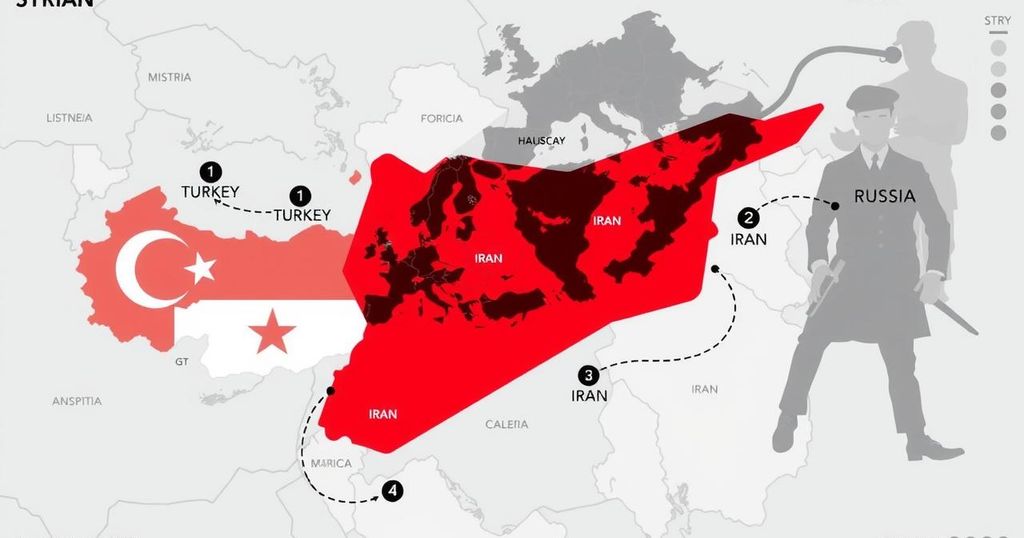Syria faces significant changes as Bashar al-Assad’s regime appears to have collapsed, leading to power vacuums filled by various armed factions like Hayat Tahrir al-Sham (HTS). International dynamics are reshaping with Turkey gaining influence while Iran and Russia’s roles diminish. The future governance of Syria hinges on factions’ abilities to unite and more effectively manage regional aspirations, all while addressing pressing humanitarian concerns.
In a significant shift, Syria appears poised for a new chapter following the reported ousting of long-time dictator Bashar al-Assad, who has reportedly fled to Russia. This power vacuum has sparked optimism among many Syrians, including those who have sought refuge abroad. The landscape in Syria is now characterized by various factions exerting control over different regions, each benefiting from the backing of major international players such as Turkey, Iran, and Russia.
Among these groups, Hayat Tahrir al-Sham (HTS) has emerged as a dominant force. Founded in 2011 as an al-Qaeda affiliate, HTS has since rebranded itself and purged extreme elements, focusing instead on the removal of Assad and Iranian militias from Syrian territory. Their recent territorial gains, particularly in Aleppo and beyond, have been facilitated by a ceasefire agreement between Turkey and Russia that has allowed HTS to strengthen its governance structure and military capabilities.
Turkey’s backing of HTS has been crucial in the recent military offensives, as Ankara has leveraged its influence to support rebel operations against Assad’s regime. With a significant number of Syrian refugees on its territory, Turkey has a vested interest in ensuring the return of these individuals while also maintaining a strategic interest in countering Kurdish forces in northern Syria.
Conversely, Iran perceives the fall of Assad as a critical setback, losing access to a vital land corridor to the Mediterranean that facilitated the movement of its proxies, such as Hezbollah. This shift curtails Iranian influence and undermines its strategic operations in the region. Likewise, Russia, which has heavily invested in Assad’s regime through military support, now faces strategic dilemmas concerning its military bases in Syria. The conflict in Ukraine has diverted Moscow’s attention and resources, leading to questions about its continued presence and influence in Syria.
Efforts by Turkey, Iran, and Russia to mediate peace in Syria have largely faltered, with significant divisions among various factions stalling progress. The Kurdish-led Syrian Defence Forces (SDF) continue to gain ground, supported by the United States, which complicates the geopolitical dynamics further. Meanwhile, the Turkish-backed Syrian National Army remains a fragmented yet significant player in the region.
The absence of a cohesive, unified government led by Syrian actors could invite further interference from external powers seeking to capitalize on the instability. The future of Syria’s reconstruction and governance now hinges on the ability of its diverse factions to come together, establishing a new order that reflects the aspirations of its people without succumbing to the influence of former patron states.
The current situation in Syria follows a prolonged civil war that has devastated the country and altered regional dynamics. The ousting of Bashar al-Assad represents a potential turning point, as various armed groups vie for control amidst shifting allegiances from international players like Turkey, Iran, and Russia. This fragmentation complicates prospects for peace and reconstruction, highlighting the diverse interests and strategies at play within a complex geopolitical landscape.
In conclusion, the recent developments in Syria following the ousting of Bashar al-Assad reveal a significant fragmentation of power among various factions, each backed by regional and international actors with competing interests. The shifting dynamics favor Turkey as a key influencer, but also present substantial challenges for Iran and Russia, who have lost considerable ground. The future governance of Syria remains uncertain, and the ability of its factions to unite will be essential in rebuilding the nation and establishing a stable political landscape.
Original Source: theconversation.com






